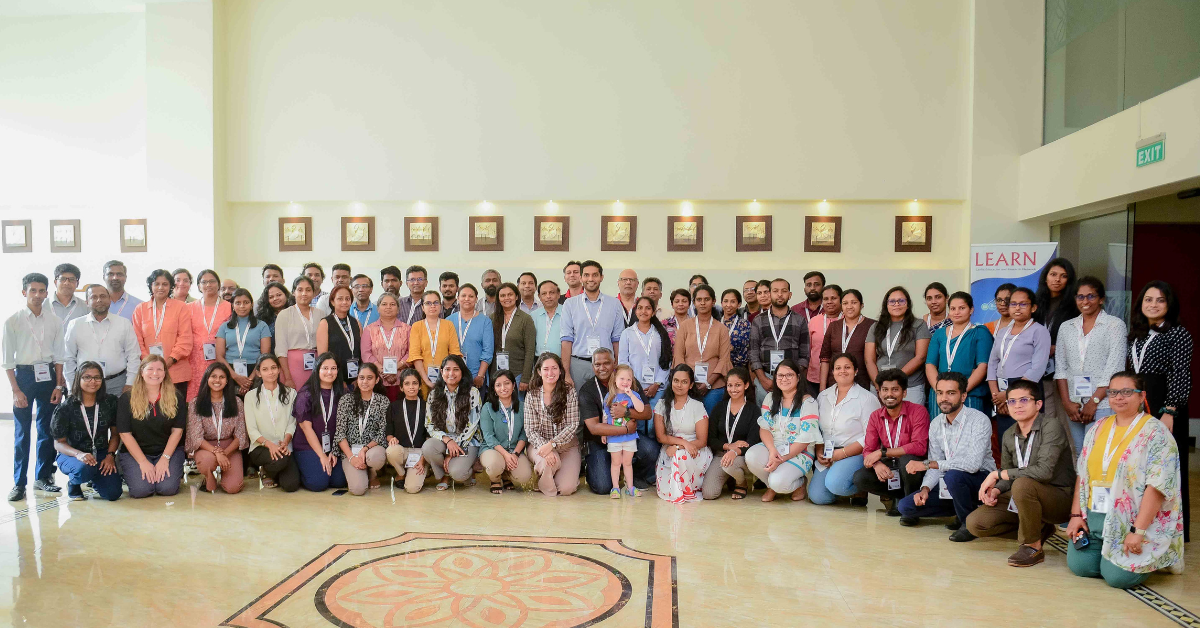In today’s fast-evolving digital landscape, embracing emerging technologies is essential for educators to remain at the forefront of modern learning. Recognising this imperative, LEARN, in partnership with the UNESCO Chair of Asia Pacific University (APU), introduced the Artificial Intelligence: Innovative Designs for Education (AIDE) programme to Sri Lanka. Designed to elevate teaching and research capabilities, the AIDE programme facilitates the seamless integration of Generative AI (GenAI) tools into academic and administrative practices.
From the 11th to the 14th of March, 300+ educators (academic administrators, academics and researchers, teacher trainers and school teachers) from Sri Lanka participated in the first stage of the programme. This initial stage was a series of workshops designed to introduce and enhance their skills in utilising GenAI. They were conducted by a team from APU, which consisted of Ts. Jonathan Kovilpillai, Program Manager of the Digital Learning Hub, and Dr. Vaikunthan Rajaratnam, Adjunct Professor of Innovative Digital Learning, alongside Fahd Raza, a PhD Candidate and Learning Designer. Together with them, participants explored the different ways GenAI can be utilised in academia.
The programme’s inaugural workshops, conducted in parallel modules each day, provided participants with practical insights and hands-on experiences to harness GenAI effectively. Beyond immediate capacity building, these workshops mark the initial steps towards LEARN’s ambitious vision of empowering 10,000 Sri Lankan educators and administrators to become skilled practitioners of GenAI by the end of 2024. Here’s a glimpse into the AIDE workshops and some key learnings participants gained.
An introduction to GenAI and prompting
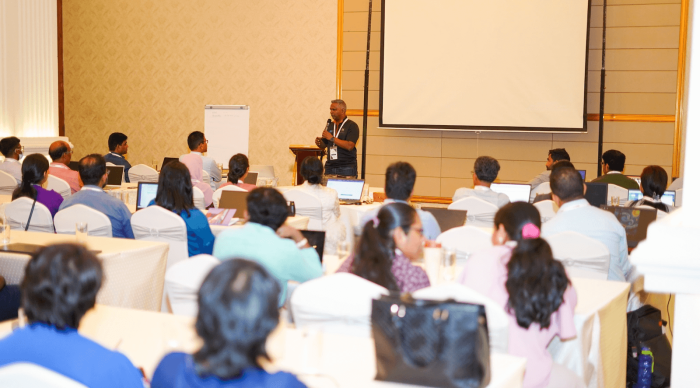
Across the four days of AIDE Sri Lanka, a foundational element of each session was a general introduction to GenAI and prompting. During his introduction, Ts. Jonathan emphasised how the rise of GenAI has been followed by a growing demand for prompting skills as employers seek talent that’ll help them maximise the value of GenAI. Both he and Dr. Vaikunthan then proceeded to highlight that a good prompt is a detailed one that communicates context. Thereby, allowing the GenAI to give the desired output. With that in mind, the first step Ts. Jonathan explained was to ask, “What is the objective of your giving this prompt? Be very clear with this foundation.”
Afterwards, the next step is to use an evidence-based approach for any response. “If you cannot validate the output from GenAI then don’t use it,” stated Ts. Jonathan. This is where artificial intelligence meets human intelligence and highlights how AI alone isn’t replacing humans. “It’s a human using AI that will replace you,” echoed Dr. Vaikunthan. Crucially, the trainers stressed the importance of privacy and not sharing personal information. Equally important is to utilise clear and direct language to give such tools appropriate context. With this foundation established, the trainers delved into the specific topics of the respective workshops.
AI for Learning Design
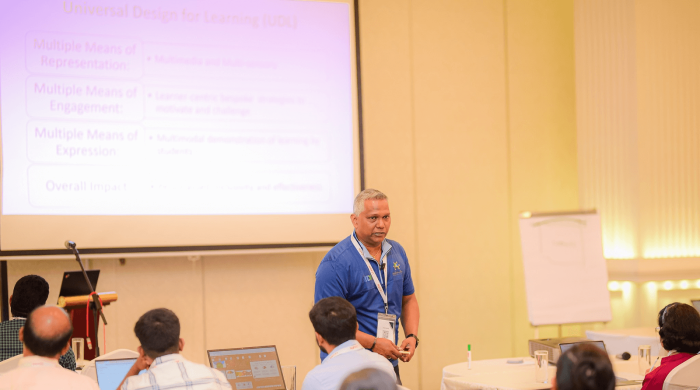
The AIDE LD workshop explored how educators can useGenAI to design learning plans with engaging content. This combination would foster compelling and imaginative educational experiences that resonate with digital-age learners. The session began with participants being introduced to prompting and tasked with creating a lesson plan using GenAI. Both trainers stressed the importance of defining the learning outcomes beforehand. It was a moment where the expertise of the participants was necessary for the GenAI to give a usable output. To quote Fahd, “ChatGPT cannot do your work for you. But it can help you do your work. So use it as an assistant, not as a replacement.”
Once the participating educators had a lesson plan in hand, the workshop delved into tools they could use to create content for it. During this segment, the trainers showcased in detail how educators can use GenAI to create both images and videos in addition to text. After another hands-on exercise, Jonathan encouraged participants to upload their newly generated content to the Learning Management Systems (LMS) of their institutions. Thereby, allowing for asynchronous learning. Crucially, Jonathan emphasised educators to upload videos they create for their courses directly to the LMS, explaining, “Our competition is Tik Tok. So when students leave the LMS to YouTube or elsewhere, they aren’t coming back.”
Finally, having explored how GenAI can be used to design lesson plans, create content, and disseminate it, participants were guided on using GenAI to create effective assessments. At this crucial closing juncture, the trainers once again stressed GenAI is simply a tool for educators to use with their experience to speed up the process of creating effective assessments that’ll help their students think on the subject matter.
AI for Researchers
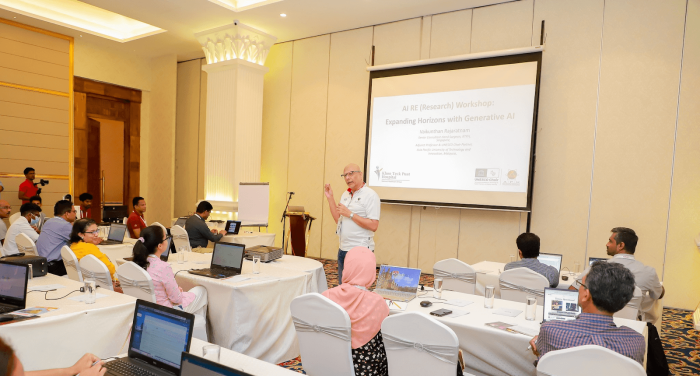
The AIDE RE workshop was organised to assist educators and researchers in harnessing GenAI for their research activities. Dr Vaikunthan began by briefing the participants that the goal of the workshop was for them to create a research proposal. With this goal in mind, the session began by reviewing the different stages of academic research typically followed. The first and foremost step is to identify a proper research question. Dr. Vaikunthan explained its importance, stating that it guides the research process, defines boundaries, ensures focus, and allows for meaningful analysis and conclusions.
With this foundational guide, Dr. Vaikunthan shared a few tips and frameworks to help participants refine their research questions. Afterward, the workshop participants were given an introductory presentation on GenAI and prompting. Following this introduction, they were tasked with formulating a research question, refining it with GenAI, and conducting a preliminary literature review. To assist with the latter, Dr. Vaikunthan introduced two GenAI tools that researchers could utilise. Throughout the workshop, he demonstrated how researchers could enter their research questions, have GenAI identify relevant academic papers, and summarise their key findings. Thus saving considerable time.
Equipped with these newfound skills, participating researchers of the AIDE workshop were then tasked with using GenAI to perform a literature review for their research question and draft an introduction to their study. Afterwards, they were tasked with selecting a study design based on their initial research question. To help participants decide, Dr. Vaikunthan offered a detailed overview of 3 such designs: quantitative, qualitative, and mixed-methods research design. This briefing was followed by a showcase of how GenAI can assist researchers with data analysis for quantitative and qualitative research. Finally, the AI Research workshop concluded with an exercise where participating researchers utilised their newfound knowledge of GenAI to put together a research proposal.
AI for Healthcare Professionals
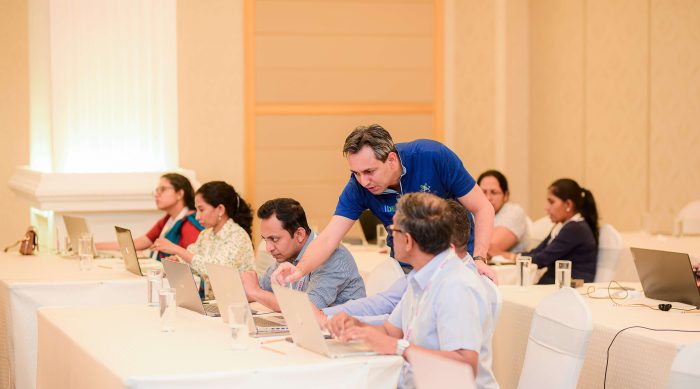
The AI HP workshop within the AIDE programme targeted health professionals, showcasing how to leverage GenAI in both educational and clinical contexts. Thereby enabling them to enhance patient care and diagnostics, educate students, and help them plan their treatments. Dr. Vaikunthan opened by demonstrating GenAI’s potential in healthcare, spanning from management to predictive medicine and informed clinical decision-making. Yet, challenges persist, such as the secure and ethical management of sensitive patient data by medical practitioners. Afterwards, participants were given a hands-on exercise to craft a clinical question and have a conversation about it with a GenAI tool of their choice.
The next stage of the workshop explored the use of AI chatbots in the world of medicine. Dr. Vaikunthan shared how they can be used to automate tasks like patient education, remote monitoring, supporting clinical decisions, mental health support, and even patient triage to a certain level. However, across all of these activities, compliance with healthcare regulations was emphasised. Attendees then created chatbots, where they were guided from building a knowledge base to designing user interactions. Following this segment, the workshop then transitioned to GenAI’s role in medical education. Participants were then guided on how GenAI can be used to assist with designing course content creation to crafting assessments. Finally, the workshop closed with participants witnessing how GenAI tools can augment their research endeavours, offering a holistic view of GenAI’s potential in medical practices and education.
A wider collection of specialised workshops by AIDE
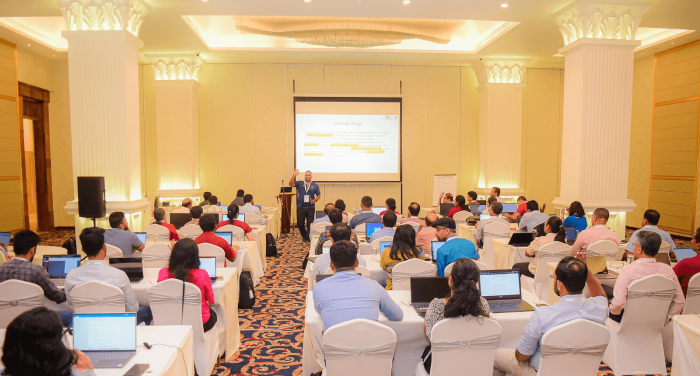
In addition to the comprehensive workshops detailed above, the AIDE Sri Lanka programme featured several parallel sessions across the five days catering to various facets of education and research. These workshops, each tailored to specific roles and objectives, further enriched the learning experience for participants, broadening their understanding of the practical applications of Generative AI (GenAI) across different domains.
AI for Teachers:
Educators and Teacher trainers at lower and middle-level schools were equipped with invaluable tools and strategies through the AI TEACH workshop. The aim was clear: to empower teachers with GenAI resources to revolutionise course design and teaching methodologies. By harnessing GenAI tools, participants gained insights into developing dynamic curriculum content and fostering inclusive, technology-enhanced learning environments. The workshop concluded with participants adept at leveraging GenAI to enhance course delivery and student engagement, thereby enriching the educational experience.
AI for Administrators:
Addressing the administrative realm of educational institutions, the AI LEAP workshop focused on leveraging GenAI to streamline operational tasks and enhance efficiency. Educators and administrators alike were guided through the implementation of GenAI tools for scheduling, reporting, and resource management. By the workshop’s conclusion, administrators were equipped with the skills necessary to deploy GenAI effectively, optimising administrative processes and fostering a more agile educational ecosystem. Participants were also shown how to create and deploy chatbots that could help them alleviate the repetitive task of responding to frequently asked questions.
AI for Academic Writing:
For researchers seeking to elevate their scholarly endeavours, the AI AW workshop offered invaluable insights into leveraging GenAI for streamlined and rigorous academic writing. Participants embarked on a journey to harness GenAI for structuring, writing, and editing academic papers, with a keen emphasis on maintaining academic integrity standards. By the workshop’s end, participants emerged equipped with the tools and techniques to expedite the writing process while upholding the highest academic rigour, thus enhancing their scholarly output and impact.
The positive outcomes of the AIDE workshops
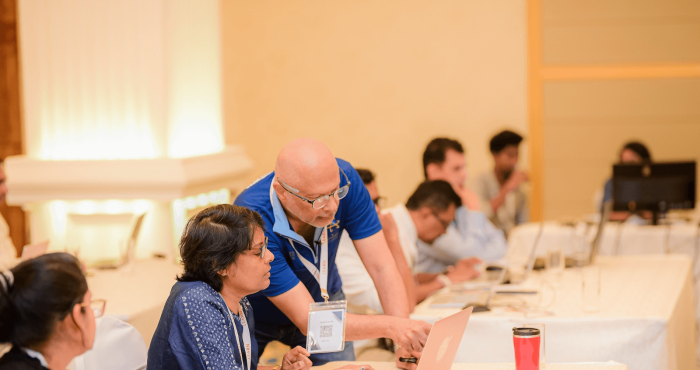
The AIDE workshops culminated in a series of transformative outcomes, underscoring the programme’s impact on education in Sri Lanka. Over four intensive days, over 300 participants immersed themselves in the dynamic world of GenAI and learned how it can be a powerful assistant in their respective fields. Additionally, 50 individuals were also identified and trained to conduct future sessions. These trained facilitators are poised to contribute to LEARN’s ambitious vision of empowering 10,000 Sri Lankan educators and administrators in utilising GenAI by the end of 2024, paving the way for widespread innovation and advancement in educational and administrative practices.
Moreover, the AIDE workshops catalysed academic growth and research excellence. This was evidenced by several participating researchers submitting proposals for research projects. Beyond the quantitative metrics, the workshops fostered a vibrant ecosystem of collaborative innovation. Participants emerged not only equipped with practical skills and strategies but also with a renewed understanding of GenAI. The collective energy and enthusiasm witnessed throughout the workshops underscored the potential of GenAI to empower educators and drive positive change for education in Sri Lanka.
